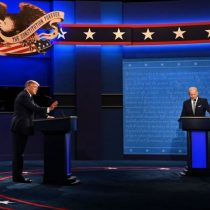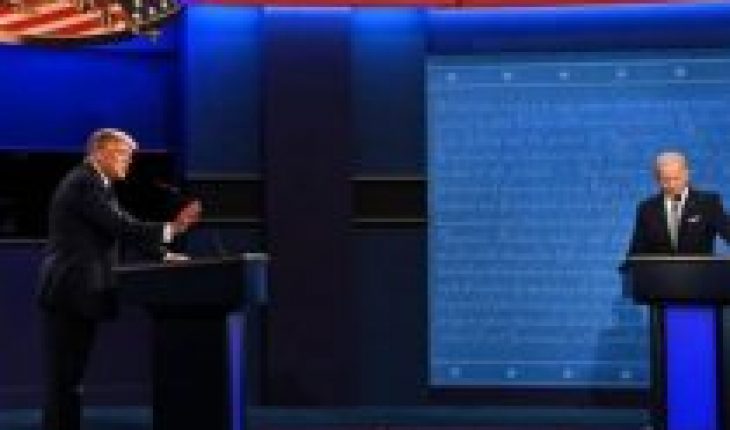
A debate that was “the political equivalent of a war with food.”
That’s how BBC North American analyst Anthony Zurcher rates what happened Tuesday night in the first head-to-head match of Donald Trump and Joe Biden.
“The winner was the man who finished least covered in waste,” Zurcher says.
The President of the United States and his Democratic opponent met in Cleveland, Ohio, in the first of three presidential debates to be held before the November 3 election.
Biden came out better “even if it was only because his main goal was to show Americans that he could withstand the pressure, that he has not lost his way because of his advanced age.”
“I had to show that I could get a shot, metaphorically speaking, and stay calm,” Zurcher says.
“He did that most of the time, though it was at least in part because Donald Trump, for his constant intimidation and interruptions, rarely gave the former vice president a chance to say something really detrimental to his own cause,” he adds.
Trump needed this debate to shake off a campaign that tilted against him, but in which he has remained remarkably stable, even in the face of economic, health and social adversity, he explains.
“It seems unlikely that anything in this bray alters the dynamics of this contest or changes the minds of one in 10 American voters who says he is still undecided (although he may not want to see a debate again).”
From the very beginning it became clear that Trump would seek to shake Biden with constant interruptions and attacks. A CBS News recount says the president interrupted his rival 73 times.
That resulted in a “chaotic” face-to-face, says Zurcher, in which Trump questioned Biden’s intelligence and Biden called his rival a “clown” and even said, “You want to shut up, man?”
Time and again, Trump attacked Biden, who was only laughing and moving his head in a sign of disapproval.
When moderator Chris Wallace announced that the coronavirus was going to be the next topic to comment on and that both candidates would have two and a half minutes uninterrupted to respond, Biden joked, “Good luck with that.”
The pandemic
The issue of covid-19 was always a difficult ground for the president and the issue arose at the beginning of the debate. Trump had to defend his management from the pandemic that has left more than 200,000 Americans dead.
He did so by saying that the steps he has taken prevented further deaths and suggested that with Biden there would have been “millions” of the dead.
Biden’s response was to speak directly to the camera, asking viewers if they could believe Trump. “A lot of people died and many more are going to die, unless he gets a lot smarter, make him faster,” Biden said.
“This take and daca showed a fundamental difference in the way the two candidates view the pandemic and whether the situation is getting better or worse,” Zurcher said.
47 years old
One message Trump’s campaign wanted recorded in americans’ minds is that Biden has had nearly half a century in public service to solve the country’s problems without success.
“In 47 months, I’ve done more than you’ve done in 47 years,” Trump told the former vice president, to which Biden replied, “With this president we have become weaker, sicker, poorer, more divided, and more violent.”
“In 2016 Trump successfully confronted Washington and the status quo. Doing so again, having spent three and a half years in the Oval Office, would have been a challenge. The way he could do it was by using Biden’s longevity in public life against him,” Zurcher says.
Racism and white supremacists
The debate brought together racial issues and urban violence, and that led to exchanges that made it clear that Biden felt more comfortable talking about the former, while Trump wanted to talk about the latter.
Biden accused the president of promoting racist divisions, while Trump lashed out at his rival citing Democrat support for a 1993 crime bill, which led to higher rates of incarceration of African-Americans.
The moderator offered Trump the opportunity to openly reject the violence of white supremacists and militias, but the president reversed by linking leftist organization Antifa to Democrats.
“Wallace had given both candidates the opportunity to attack their ownwhich can sometimes be a smart political strategy. But they both avoided doing it,” Zurcher says.
Biden didn’t take advantage of the issue of taxes
When the New York Times’ report on Trump’s taxes – who allegedly paid almost nothing to the tax for years – came out – political analysts wondered how he would handle this during the debate.
Trump defended himself as in 2016, when he boasted that he knew how to handle the tax code and boasted of being smart for paying little.
“Biden tried to turn the issue into a condemnation of Republican-approved tax reform. While noting that Trump paid less federal taxes than teachers, that message, which may have been a powerful attack, was buried in the verbal fight that followed with the president,” Zurcher says.
“If Trump’s tax returns have any weight as a subject in this campaign, it won’t be for this debate,” he added.
“This won’t end well”
The closing segment of the debate was on the integrity of elections and concerns on both sides that the election will not be free and fair.
“This won’t end well,” Trump said at one point, a sentiment that many Americans on both sides will agree with, albeit for different reasons.
Biden called for all ballots to be counted and promised to respect the results of the election. He seemed to have a few more points to conclude, but Trump interrupted him again and then Wallace announced that the debate was over.
“It was the sudden end of a chaotic evening that can hardly be called debate in the traditional sense of the word. These events rarely influence one choice one way or another, and this was such a confusing mess that it seems unlikely that they have changed the perception of some,” Zurcher says.
“It’s probably bad news for Trump, given that one of his real weaknesses is that many suburban voters dislike the president’s sometimes rude ways,” he continues.
“On the other hand, if Trump’s goal was to turn this campaign into an unpleasant slop, leaving voters alienated and with the uncertainty of whether there will be any clarity or resolution in the end, well, it was a job well done.”





